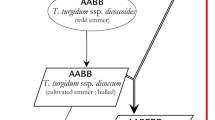Abstract
Irrigation-induced salinity is a major constraint to crop production in many countries. K+/Na+ discrimination is a trait which enhances salinity tolerance in bread wheat compared to durum wheat, and is present in the wheat ancestor Aegilops tauschii. An experiment is described to assess K+/Na+ discrimination, and other traits, in a number of synthetic hexaploid wheat genotypes, produced by crossing Ae. tauschii with durum wheat. The durum parents of the synthetics were also used in the experiment, along with the CIMMYT test set of salt tolerant entries, and some synthetic hexaploid-based drought-tolerant germplasm. K+/Na+ ratios were lower in the durum parents than in the elite synthetics, confirming that the trait was present in the synthetics, and demonstrating its successful transfer from Ae. tauschii to the synthetic hexaploid wheat (2n=6x=42, AABBDD). The 14 best-performing synthetics had similar K+/Na+ ratios to the tolerant check S24. There were highly significant correlations between K+/Na+ discrimination and fresh weight within the durum parents, the elites, and the CIMMYT set. Backcrosses of some elite synthetics with the drought-susceptible hexaploid Opata failed to show the same level of discrimination as Opata.
The potential of two elite synthetics which were also tolerant to waterlogging, and one tolerant to multiple biotic stresses, for use in breeding programmes for stressed conditions was noted.
Similar content being viewed by others
References
Ashraf, M. and O’Leary, J.W. (1996) Responses of some newly developed salt-tolerant genotypes of spring wheat to salt stress: 1. Yield components and ion distribution. J Agron Crop Sci 176: 91–101
Diaz de Leon, J.L., Escoppinichi, R., Zavala, R. and Mujeeb Kazi, A. (2000) A sea-water based salinity testing protocol and the performance of a tester set of accumulated wheat germplasm. Ann Wheat Newsl 46: (HTML Edition) Items from Mexico.
Francois, L.E., Maas, E.V., Donovan, T.J. and Youngs, V.L. (1986) Effect of salinity on grain yield and quality, vegetative growth and germination of semi-dwarf and durum wheat. Agron J 78: 1053–1058
Gorham, J. (1990a) Salt tolerance in the Triticeae: K+/Na+ discrimination in Aegilops species. J Exp Bot 41: 615–621
Gorham, J. (1990b) Salt tolerance in the Triticeae: K+/Na+ discrimination in synthetic hexaploid wheats. J Exp Bot 41: 623–627
Gorham, J., Wyn Jones, R.G. and McDonnel, E. (1984) Pinitol and other solutes in salt-stressed Sesbania aculeata. Z Pflanzenphysiol 114: 173–178
Gorham, J., Hardy, C, Wyn Jones, R.G., Joppa, L. and Law, C. (1987) Chromosomal location of a K+/Na+ discrimination character in the D genome of wheat. Theor Appl Genet 74: 584–588
Munns, R., Hare, R.A., James, R.A. and Rebetzke, G.J. (2000) Genetic variation for improving the salt tolerance of durum wheat. Aust J Agric Res 51: 69–74
Mujeeb Kazi, A (1995) Interspecific crosses: hybrid production and utilization. Chapter 3 in: A.M. Kazi and G.P. Hettel (eds): Utilizing Wild Grass Biodiversity in Wheat Improvement: Fifteen Years of Wide Cross Research at CIMMYT. CIMMYT Research Report No. 2, ISSN 0188-2465.
Mujeeb-Kazi, A., Rosas, V. and Roldan, S. (1996) Conservation of the genetic variation of Triticum tauschii (Coss.) Schmalh. Aegilops squarrosa auct. non L.) in synthetic hexaploid wheats (T. turgidum L. s. lat. x T. tauschii; 2n=6x=42, AABBDD) and its potential utilization for wheat improvement. Genet Res Crop Evol 43: 129–134
Mujeeb-Kazi, A., Fuentes-Davila, G., Gilchrist, L.I., Velazquez, C. and Delgado, R. (1999) D- genome based synthetic hexaploids with multiple biotic stress resistances. Ann Wheat Newsl 45:105–106.
Shah, S., Gorham, J., Forster, B. and Wyn Jones, R.G. (1987) Salt tolerance in the Triticeae: the contribution of the D genome to cation selectivity in hexaploid wheat. J Exp Bot 38: 254–269.
Trethowan, R., Van Ginkel, M. and Mujeeb-Kazi, A. (2000) Performance of advanced bread wheat x synthetic hexaploid derivatives under reduced irrigation. Ann Wheat Newsl 46:87–88.
Villareal, R.L., Sayre, K., Banuelos, O. and Mujeeb-Kazi, A. (2001) Registration of four synthetic hexaploid wheat (Triticum turgidum/Aegilops tauschii) germplasm lines tolerant to waterlogging. Crop Sci 41:274.
Author information
Authors and Affiliations
Corresponding author
Rights and permissions
About this article
Cite this article
Pritchard, D.J., Hollington, P.A., Davies, W.P. et al. K+/Na+ discrimination in synthetic hexaploid wheat lines: Transfer of the trait for K+/Na+ discrimination from Aegilops tauschii into a Triticum turgidum background. CEREAL RESEARCH COMMUNICATIONS 30, 261–267 (2002). https://doi.org/10.1007/BF03543417
Received:
Accepted:
Published:
Issue Date:
DOI: https://doi.org/10.1007/BF03543417




